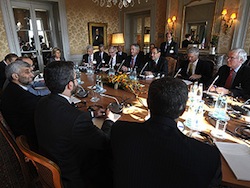Nuclear Talks Commence Between Iran and P5 +1
October 1, 2009
Featured Image
Iran Meets U.S. and Allies for Nuclear Talks in Geneva - New York Times [link]
- Critical talks over Iran’s nuclear ambitions began Thursday morning in the Geneva countryside, with Washington and its allies hoping to draw Iran into a serious negotiation that will open up the country to serious nuclear inspections, suspend Iran’s nuclear enrichment program and reassure its neighbors that its intentions are peaceful.
- The United States, which will be joined at the table by Britain, France, Germany, Russia and China, is likely to offer Iran a repackaged version of something it has offered before: an agreement to hold off on new sanctions if the Iranians agree to freeze their enrichment of uranium, so that serious negotiations can take place.
- “They have been on the wrong side of the law,” said [IAEA Director Mohamed] ElBaradei, who is normally circumspect and has said that fears over Iran’s nuclear program are exaggerated.
Talking with Iran: A Geneva Scorecard - Laura Rozen in Politico [link]
- What to look for: “If anything happens, it will not happen in the first four hours of meetings,” said former veteran U.S. National Security Council Iran hand Gary Sick. “With 49 people sitting around a room, listening to each other’s speeches, the first part is going to be incredibly boring and useless. But at some point, someone is going to have to suggest … either ‘Let’s break this off’ or ‘We would like to explore further the possibility of any accommodation on this.’
- Wild card: Negotiations lasting beyond the one-day talks, as well as side negotiations between less visible members of delegations that take place beyond the view of the one-day plenary meeting.
U.S. Opens Door To Bilateral Talks With Iranians - Washington Post [link]
- U.S. officials signaled Wednesday that they will seek a rare bilateral meeting with Iranian diplomats during the discussions.
- The talks could be the most substantial and in-depth conversation between the United States and Iran since relations were severed after the Iranian revolution 30 years ago.
- As a sign of U.S. seriousness -- and the intense media interest -- a substantial team of White House and State Department officials, including three spokesmen, is accompanying [Under Secretary of State William] Burns.
Possibility of Nuclear Iran Alarms Arabs - New York Times [link]
- Among Iran’s Persian Gulf neighbors there is growing resignation that Iran cannot be stopped from developing nuclear arms, though Iran says its nuclear program is for peaceful uses.
- Some analysts have predicted that a regional arms race will begin and that vulnerable states, like Bahrain, may be encouraged to invite nuclear powers to place weapons on their territories as a deterrent.
- “I think the gulf states are well advised now to develop strategies on the assumption that Iran is about to become a nuclear power,” said Abdul Khaleq Abdullah, a political science professor at United Arab Emirates University. “It’s a whole new ballgame. Iran is forcing everyone in the region now into an arms race.”
Obama's Opportunity in Iran - Nicholas Burns in the Boston Globe [link]
- The president’s patient diplomatic pressure on Iran is a more sophisticated strategy with a better chance of actually arresting Iran’s nuclear efforts. Because of it, the United States has significantly greater credibility to take advantage of Iran’s mendacity and to lead an international coalition toward comprehensive sanctions should talks fail.
- Having offered an olive branch to Tehran during the last nine months, Obama must now make unmistakably clear that the United States will be a very tough opponent in the months ahead. Whether he can succeed in turning up the heat will be a key factor in how this high-stakes drama plays out this autumn.
Obama's No-Nukes Vision - David Krieger in The Hill [link]
- Many pundits dismiss the idea of even taking the next steps in this endeavor as being Pollyannaish or unachievable. But the president sees it differently and should be commended for using the moral strength of the United States and renewing his commitment to this important endeavor as he led the U.N. vote.
- The goal, which is within sight, is a new treaty, a Nuclear Weapons Convention, for the phased, verifiable, irreversible and transparent elimination of these weapons of mass annihilation.
A View from the Dark Side
Obama's Foreign Policy Vision Not So New Age - Kim Holmes in the Washington Times [link]
- Take Mr. Obama's "comprehensive agenda" to rid the world of nuclear weapons. This dream is as old as the first atomic bomb explosion.
- Arms control agreements have failed so many times, it's hard to keep track of the failures. Despite all these agreements, North Korea and Pakistan managed to get their own nuclear weapons, and Iran is close behind.



